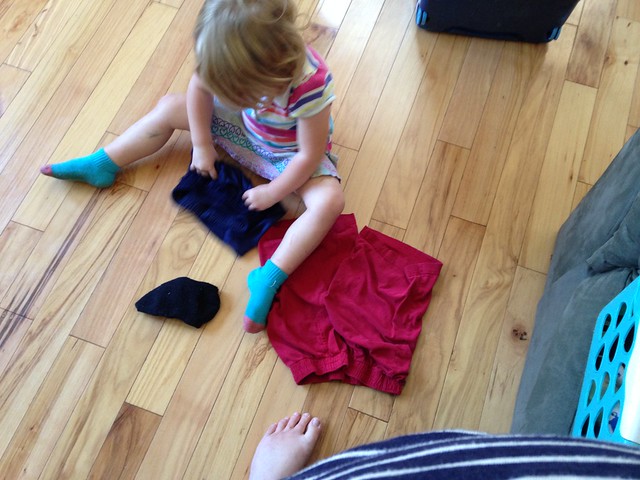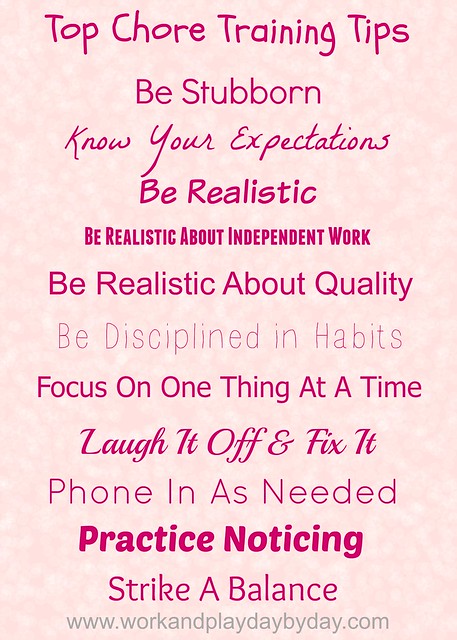Earlier this week I shared my *secret* cleaning routine that leaves me more time for other things that I enjoy more. Today I have a confession to make.
Like all things that sound too good to be true, that may be the case with my method as well.
See, in order to be successful with my approach, you have to spend time in training and formation: both for you and for your kids. The truth is, though, that to be successful in just about anything you have to spend time in training and formation. The good news, is that this isn’t a particularly rigorous program and anyone can do it at any time… if they decide they are going to be stubborn enough to stick it out.
That’s my first tip, actually. Be stubborn. Not mean, obstinate, difficult, or disagreeable. Just stubborn. Refuse to give up until what you want to happen is happening.
Which leads right into my next tip: Know your expectations. You have to know what you want to have happen. Because if you don’t even know what you want to have happen, your children and husband definitely don’t know what you want to have happen.
Of course, in knowing your expectations you bring yourself right along to my next tip. Be realistic.
Specifically, there are many things to be realistic about. Be realistic about how much independent work your children are capable of. If you are paying bills in the house, or reading a book, or talking on the phone, or checking Facebook don’t expect that your children will magically be out on their own getting stuff done. Working together, everyone gets more done. Think of it as everyone eating the a piece of the same pie and then moving on to the next pie instead of all eating one piece from your own pie and then having a bunch of partially eaten pies. Maybe pie is a bad example, but a bunch of partially finished jobs will add to you feeling that cleaning is a never ending job. You may have noticed, I never once mentioned Lucie in my previous post on cleaning. That’s because she is usually close by me or one of the older kids doing whatever we do. That’s how she learns the jobs and how we keep her from undoing our work in another part of the house.
 |
| You can see I am also keeping Tomas close these days…… |
Be realistic about quality. Have high expectations of quality, and don’t be afraid to send someone back if they don’t do a complete job, but make sure that your quality expectations are age appropriate. As in, they won’t be the same forever. You should not expect the same quality window washing from a three year old and a thirteen year old. This is one reason we rotate jobs at our house. Everyone gets a chance to learn the job, but more expert cleaners are rotated in with the still-learning cleaners. But do be on the lookout for laziness and your older child back to fix a job they were perfectly capable of doing better. Bonus tip: If you are working with your children you will know exactly what your children are and are not capable of and will be able to nip laziness in the you-know-what before it becomes a habitual problem.
Habits are the key to the next tip: Be disciplined in developing habits for yourself and for your children. It is a habit to put shoes and coats in the proper place when you arrive at home. It is a habit to wipe down your kitchen counters when you finish preparing food. It is a habit to bend over and pick up a kleenex that misses the garbage can. It is a habit to wipe out the sink if you make a mess of toothpaste. I really love the Charlotte Mason analogy of habits being like rails that are difficult to depart. Once these sorts of small acts become habits we don’t need checklists or long lists of cleaning tasks. Picking up, for the most part, doesn’t become a cleaning task of its own, but rather a part of a complete work cycle.
When developing habits, however, Focus on one thing at a time. This is another tidbit of wisdom from Charlotte Mason practitioners. We didn’t learn to read by trying to learn the entire alphabet and all the phonics rules in one sitting. We took it one letter at a time and small words built into bigger words with more complicated rules and systems. The nice thing here is that there isn’t a set sequence for learning new habits. You can choose one as a family and focus on it for a month or two until everyone has it down and then work on the next one. It doesn’t matter when you start, or how old your kids are. (I never even heard of Charlotte Mason until my oldest was 6.)
You will make mistakes, and so will your kids. Learn to laugh it off and fix it. Even when you have the most well developed habits you will still have oopses. I am chronically horrible about serving really messy lunches right after I mopped the floor. I could (and sometimes do) yell at my kids and get frustrated with them for being messy. Or I can make a joke with one of my older kids about what a silly thing that was to serve for lunch or comment that I should have waited to mop and just fix it. In seeing me joke about my own mistakes my kids are much more likely to have a lighthearted attitude towards their own work. The problem in our house is not making a mistake, it’s not being willing to fix it.
Sometimes, I just can’t seem to laugh it off and it is time to give myself a break. Allow yourself and your children to phone it in from time to time. Hark work is important, but sometimes we just need a little break. I won’t even list all of the reasons that sometimes moms, dads, and kids might not be able to give 100% to their jobs. Teach your children to cover for each other when someone isn’t feeling well, and they will eventually cover for you when it is your turn! (Hello morning sickness or bed rest.)
Train all of your children in the art of noticing. Point out how enjoyable it is to pull up into the driveway and see the bikes all parked neatly. On little stuff like this, I’ve noticed sometimes a few “noticings” of my own will lead to action on the part of the kids. Sometimes when we are doing our weekend clean, we will play a version of I-spy where I stand in the middle of the room and point out things I can see that are out of place while the children race to fix them. When they are older and working independently, I ask them to play I-spy on their own and see if they can stump me so I can’t find anything when I check their job. Usually they will find a couple more things they missed when they were trying to rush through to finish (because they are kids..they still rush). The noticing game becomes a tool that helps older children work more independently.
Finally, Strike a balance of work and play. I’m all about a balance of work and play. I’m also all about having fun while you work so that it feels like play. Teaching children to have a joyful and helpful attitude about chores is all about helping them see why it matters. It matters because when our jobs are finished we have more time for fun, both as a family and as individuals. It matters because when our house is well cared for, we are better able to use our home as a tool to bless other people. It matters because it is more restful to relax in an orderly space. If housework is a stress point for you it will become a stress point for your children and a stress point between you (if it isn’t already).
I’m not perfect about this. No one ever could be. I do get frustrated with my kids (and sometimes yell) when laziness starts to creep into their work or other bad habits develop.
Of course I do.
What I don’t do, ok what I try REALLY hard not to do, is to let chores and cleaning be anything that comes in the way of family relationships. When I find that happening, what I also usually find is that I can almost always trace our low back to one of these principles.
The good news is that stubbornly, with discipline, we can find our way back to a peaceful and orderly home.
Well, mostly peaceful and mostly orderly.
I have to be realistic, after all!


Recent Comments